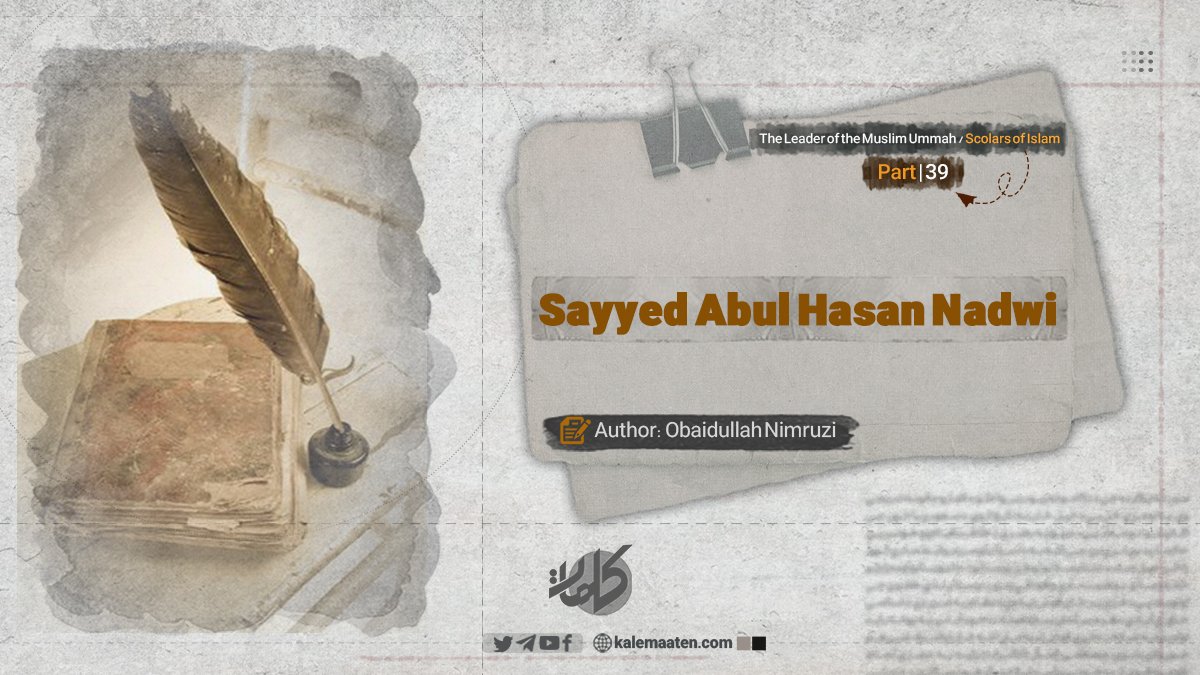
Author: Obaidullah Nimruzi
Allama Sayyed Abul Hasan Nadwi, May Allah Have Mercy on Him (Part 39)
The Spiritual Moments of Allama Nadwi’s Life (may Allah have mercy on him)
On the Way to Medina
The passion of Imam Nadwi may Allah have mercy on him, for Medina and its owner, may Allah bless him and grant him peace, originates from the fact that during his childhood, he had a very close relationship with the biography of the Prophet, may Allah bless him and grant him peace. This affection and love increased day by day through reading the book Rahmat Al-Lelalamin. In his childhood, the stories of the Holy Prophet, may Allah bless him and grant him peace, and his heroic companions were frequently recounted in his blessed family. It is certain that such an atmosphere, full of purity and spirituality, had a profound and beneficial effect on the clear and transparent mind of the child. As a consequence of this spiritual environment, the first buds of this garden blossomed, and Abul Hassan Ali, who was a seven-to-eight-year-old child, held a seminar on the Prophet’s biography with his friends of the same age.
As Imam Nadwi, may Allah have mercy on him, grew older, his passion for Hazrat Muhammad Mustafa, may Allah bless him and grant him peace, intensified. He was raised in a family that was imbued with love and affection. His mother’s heart was overflowing with love for the master of Medina, and she dedicated a part of this love to the apple of her eye, nurturing him with the milk of devotion and friendship for the master of the worlds. He had a brother who constantly urged him to embrace the Prophet’s Sunnah, may Allah bless him and grant him peace, and to love him.
Dr. Mohammad Ajtaba Nadwi writes, “As blood flows in the veins, the love of the Holy Prophet, may Allah bless him and grant him peace, surged in him and spread to his mind, heart, and veins. It was this love that ignited a flame of abundant faith and firm belief in him and inflamed his body and heart.” When he entered his youth and turned to the field of da’wah with sincerity and determination, visiting the cities and villages of his region and beyond, meeting Muslims, reading books and newspapers, he was saddened by the weaknesses and shortcomings in this regard. Consequently, he focused his energies on speeches, sermons, discussions, and lessons broadcasted on the radio networks of Arab and Islamic countries. In the book Al-Tariq al-Madinah, he writes, “The weakness of affection in these lands and the lack of spiritual and emotional connection with the Prophet, peace be upon him, has frightened the author of this book, as this danger is so great that it paves the way for all forms of rebellion and fosters inner restlessness, laxity, and chaos.”
Various factors and organized propaganda have contributed to the drying up and weakening of the sources of this love, resulting in people’s suffering from intellectual and emotional stagnation. This affliction has also spread to poetry, literature, religion, and religious manifestations.
The author wishes to serve as a humble soldier in the battle against this raging flood, aiming to revive and nurture love and affection by writing this book, which he believes is hidden like a fire under the ashes in the hearts of every Muslim.
Dr. Youssef Qarzawi states, “Imam Nadwi is a Muhammadian” and goes on to elaborate on this statement, adding: “The meaning of his being Muhammadian is not solely that he is a descendant of the Prophet, peace be upon him, and from the Hashemi and Hasani lineage. There are many Hasanis and Hosseinis whose actions starkly contradict their lineage. Whoever lags in their deeds will not be advanced by their ancestry. What is intended here is that Imam Nadwi exemplifies a character that reflects the behavior and actions of the Holy Prophet in his entire life. He followed the Prophet, peace and blessings of Allah be upon him, in the arenas of worship and asceticism, and embraced the adornment of this world in a manner that illuminated his path. Among the successors, he chose the way of predecessors, showing little concern for worldly possessions. When you see him, it is as if you are in the presence of Salman Farsi or Abu Darda, and his discourse about Hazrat Muhammad Mustafa, peace be upon him, does not resemble that of an orator or scholar; rather, it embodies the proclamations of a lover who gazes with admiration at this unique and noble figure.”
The personality of Muhammad bin Abdullah and the manifestation of this wonder are evident not only in the book Nabi Rahmat but also in his other literary works, writings, articles, and speeches. This love and sorrow arising from his profound understanding of the remarkable prophetic life and the comprehensive character of the Prophet are sources of meanings and perfections distributed among the children of Adam, all of which have been encapsulated in the nature of Hazrat Muhammad Mustafa, peace and blessings of Allah be upon him.
Continues…


